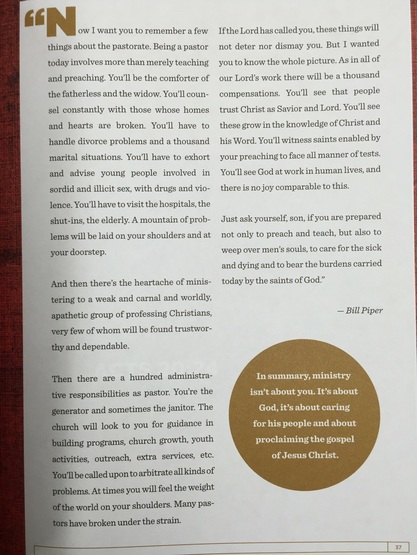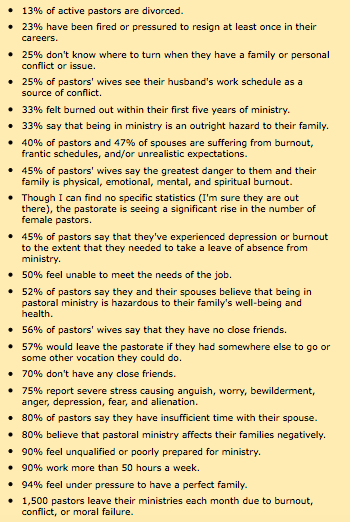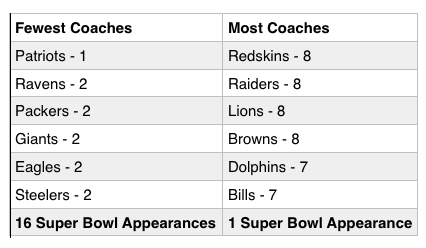 Last week I wrote on Seven Deadly Words for Leaders, "If it ain't broke, don't fix it" and how it can cripple the leadership effectiveness of any ministry. Thinking more about how important avoiding pitfalls in leadership can be, I couldn't help but look at seven more deadly words for leaders: "We've never done it that way before" Since I became a Christian in 1999, I've seen the idea of change met with incredible resistance. Why? I have no idea. Of all the work I've done on ministry leadership, experience in ministry, and gleaning for leaders in the field, the pushback against change with the "we've never done it that way before" response is as puzzling now as ever. One of the most interesting parallels between church life and the real world was in an article I read about Henry Ford and his resistance to moving on from the Model T. The irony of the article was the car that made the Ford family wealthy and powerful also became the albatross that prevented them from innovating to new technology and catching up to other emerging auto makers. For Ford, moving on towards unchartered territory was something he was unwilling to do. The connection to ministry is obvious. Where so many churches are at the plateau of their growth or declining, the sense of urgency to change and innovate is often lacking until it's too late. Why are these words deadly for a leader? Here are 4 reasons. 1. It keeps thinking "in the box" - In this mindset, the only ideas that can be floated are ideas that have been done before. Anything that doesn't fit the paradigm that already exists is considered out of line and is discarded. It's like in the Jurassic Park novel when they scan the number of dinosaurs. The computer knew to only look for the number they thought should be there, not the actual count. Their inability to think outside the box led to a lot of people being eaten. Churches may not have a loose T-Rex, but thinking inside the box overlooks obvious solutions because of an inability to entertain new ideas. 2. Conformity > Creativity - Leaders who adapt this mindset create a culture for their followers where they are expected to stay in line and lock-step rather than use their gifting and ability to be creative. In ministry this can look like a worship leader who refuses to allow for new music because it can't be played on pipe organ. Also it means that brainstorming is suppressed in the name of following a strict pattern, which leads to a cycle of inaction.  3. It leads to a crippling fear of the unknown - Last year I got to spend some time in DC for a conference, and during the down time went to the Smithsonian. One of the craziest things I saw was the Mercury spacecraft. I couldn't believe we sent someone into space in something that was the NASA equivalent of a tin can. How could we do that and not know what would happen to them? We were driven as a nation by an unshakeable desire to the world superpower, and to explore the reaches of space. What was unknown by NASA wasn't seen as something to be scared of, but an adventure to chase after. In ministry, we may not know all the details about a new initiative, but we cannot let the fear of the unknown cripple us into inactivity. 4. Decisive decisions cannot be made - One of the crippling aspects of this view is that it can turn into paralysis by analysis. Every detail must be scrutinized, evaluated, debated, discussed, deferred to a committee, or consume valuable meeting time. Ultimately, many of the important decisions that require decisive action are left on the table because of an over-focus on the mundane details. Rather than a leader making a decision that is a catalyst for action, it becomes an administrator who makes sure all the boxes are checked off. The great news is that many leaders don't live by these words, they're captivated by retaining the message of the Gospel that stands eternal and timeless with methodology and strategy that is in the context of a particular time, place, and people. For those leaders, new ways of doing things and thinking outside the box are cheered as part of God's creative gift from Genesis 1-2. These leaders don't need to have everything lined up, but are free to move in the direction that God has led them, and are in churches that recognize the importance of engaging people in a post-Christian cultural context. For them, the only sacred cow is the Chick-Fil-A cow, not the methods and activity of the past.
2 Comments
 "If it ain't broke, don't fix it" If you've not heard those words, you've probably said them. I'd be willing to bet that many of you reading this are shrugging your shoulders and wondering what the big deal is. Over the last few years, I've become increasingly convinced that not only should leaders avoid using these words, but that they can actually become a slow death for a leader or a ministry when this becomes engrained. Just because it's not broke doesn't mean it's working or effective - A lot of ministries and activities happen in a church that aren't broken. They happen regularly with a committed group of volunteers, receive annual budget funds, and are mainstays on a church calendar. But they may not be working or effective. They may take necessary funds from other ministries higher on the priority list, they may no longer reach the targeted demographic, they may not have the impact on the church or community they once had. But on the surface, they don't appear broken. "Don't fix it" kills innovative thinking - One of the things I read this summer was about Tom Brady, who had just won his fourth Super Bowl. In the offseason, he's known as a grinder in the weight room, constantly watching film and working on his throwing mechanics. In history he may be regarded as the greatest NFL quarterback of all time--the definition of "not broken." But he's always looking to innovate, to improve, to sharpen and to refine. Adopting a "don't fix it" mentality stifles the creative and evaluative processes that drive a ministry's constant improvement. One thing every ministry leader should do on a regular basis is ask "What could we change to do things better and be more effective?" In those brainstorming and evaluation sessions, very little needs to be considered "untouched." My three untouchables are weekly Bible study, regular missions involvement, and intentional small groups. Beyond that, anything and everything is fair game. It may not be broke, but it may be sick - In a lot of ways, this goes back to the first point. Leaders who assume that not-broke is healthy are failing to look beyond the initial assessment. Carefully looking at what a ministry does and asking the bigger questions "why? and what for?" help determine if something is in fact healthy. Many activities flow on a plan where the initial push leads to growth and efficiency, which then plateaus before beginning a descent (see sigmoid chart below). A lot of times we find ourselves on the plateau or on the slow descent and don't recognize where we are because, on the surface, things look good. But deep down, there is sickness that needs to be addressed.  Taking this position is the easy fix - One of the biggest takeaways from my doctoral work on leadership development was that in many cases, leaders took the easy way out. Leading significant growth, change, and culture processes requires a huge investment of time and energy. But the fruit from that is both exponential and multigenerational. However, it's easier to do just easy to keep it in maintenance mode. That became obvious when learning to drive, that the majority of the work a driver does it keep the car straight by maintaining course. It's only when there is an urgent need for change that the driver does what's necessary to steer dramatically. This view limits a leader's effective reach - When I worked at Starbucks in college and grad school, we had several times where we as a company would relaunch products or promotions. And then once we had a complete overhaul. Every store in the country closed to re-train employees and cast a new vision. The reason? Our CEO began asking questions and abandoned the "if it ain't broke" approach. The company was making money by the truck load and stores were expanding, but the growth wasn't sustainable and it wasn't in line with the company values. So instead of looking and doing nothing, Howard reached into the very heart of the company and led from the front lines, where his reach was felt throughout the company. As our product lineup was refined and we were able to return to the core values, the impact was felt by customers who had fallen in love with the "Third Place" experience. What else would you say about this phrase? How have you seen it impact a ministry?  Check out this ad from 1991 for Radio Shack (yes kids, that's where we went to get gadgets in the Dark Ages). Look at how everything in how we communicate, play, and share electronically has changed. What was once cutting edge is now on display in museums. One thing we cannot escape is that the way we do ministry is going to change. Twenty years ago in student ministry it was fueled by caffeine overnight trips, Red Rover, Chubby Bunny, and lock-ins. The way we connect with and invest in students has changed because times have changed, we've become more aware of the importance of safety, and we've recognized that lasting fruit happens when it's intentionally pursued. Making any change in student ministry needs to be something carefully thought out. I'm indebted to John Kotter from Harvard Business School for his work on leading change. His Eight Steps have proven invaluable to me over the years, and have formed the basis for how I lead change processes in student ministry. I've adapted some of his list, but here are some ways to go about leading change in your student ministry.  Have a "Dream Picture" - Kotter calls this a "strategic vision," which I've amended slightly. In the Dream Picture, you start with the end game at graduation by asking 3 questions: What do we want our students to know? What do we want them to love? What do we want them to do? These three questions help define what would be the Dream, an ideal student who graduates from our student ministry. Knowledge involves the forming of a biblical worldview, Love involves a growing and deepening faith, and Do involves missions and service within and outside the church. Build a Team - I'm intentional about who I bring in to help serve in our student ministry, because I want people who are team players, committed to serving, faithful in their church involvement, and who want to see great things happen. It's important to bring these people in to the Dream Picture and help them construct it. I often ask parents, grandparents, and young couples to serve in our student ministry so that we get a variety of perspectives. Also I think it's important to include in that team students who have proven themselves and have the maturity to get the big picture. Identify Roadblocks - When I first got to Westside, I made it very clear that we were going to make things intentional and we were going to have a plan. And that might include removing some things that didn't fit the plan. With your Team, work to identify any roadblocks in your ministry strategy, calendar, or philosophy that don't help you achieve the Dream Picture. It doesn't mean you make any change yet, it just means you've identified some areas to work through. Communicate Clearly with Parents - One of the biggest regrets I've had is that I wasn't more intentional about communicating change processes to parents. But they are the stakeholders in your ministry, not your students. They are the ones who trust you with their students. So anytime you make any change, you need to be clear in your communication. You also need to make sure that communication is two-way. Just giving information won't help win the change process, they need the opportunity to ask questions and give feedback. Sometimes they'll stop you from stepping on land mines! Be Ready for Pushback - Some of the things that you and your Team will identify as Roadblocks to the Dream Picture may be things your students love and are attached to. To prepare for this, you need to make sure you have talking points for your Team, trusted students you can enlist to help communicate, and some thick skin for any criticism you might get. Replace Losses with Gains - Whenever you remove a roadblock, it's going to be a loss for someone. The change process can go smoother when you are able to build in some wins/gains for students. One thing I said early on was no lock-ins, which is met with resistance every time I answer the question with the same answer. In order to replace that perceived loss, we build in late-night activities and I've asked those most resistant to removing lock-ins to help in the decision-making process. Work Slowly unless it's an Emergency - Leading any change process can be costly if it's done too quickly. Student ministry is no exception. I've followed a "1 Year" rule, that no roadblock will be removed for at least a year. This enables a new crop of students to come up who aren't emotionally attached, a chance for those who are to graduate, and a chance to work with the Team to develop the process and strategy. The exception is when it's a big deal that needs to be dealt with quickly. I've only done this twice. The first was create a process of financial management because our snack bar was unchecked. The second was to remove from our student ministry library the NOOMA videos by Rob Bell because of some heretical views he had taken towards salvation. Enlist your senior pastor and children's minister - The two biggest allies for a student minister are the lead pastor and the children's minister. One is your mouthpiece to the entire church, the other is your feeder for your ministry. Any significant change process you do needs to be something they are both aware of and on board with. It's good to have your lead pastor in the discussion because you want to make sure your ministry strategy and philosophy is lining up with his direction for the church, and so your children's minister can help you lead the transition to student ministry. Cheer for Change - One major change I did recently was move our camp, from one 4 hours away to one 30 minutes away. Every chance I got I took time to hype up what the new camp had to offer, how much bigger it was, and how many more friendships our students could make. I also took time to talk to a number of parents about it who quickly became cheerleaders for it. And the message was always communicated in a way that reinforced how this change was for the best and how it helped us achieve our Dream Picture. What ways have you worked to make change in your student ministry that you'd like to share?  Sports are a microcosm of life. We can watch what happens in a game and see a number of ways that applies to what we see on a daily basis. I firmly believe each major sport can show us some specific things about leadership. The NFL teaches us how important culture is in an organization for success. MLB teaches us about chemistry within a team and what separates good teams from great ones. The NBA gives us the perspective of personality and its impact on leadership. In no other sport do superstars and individual players carry as much weight and importance as they do in the NBA. That became obvious this morning when the Houston Rockets dismissed legendary player Kevin McHale as their coach, just 11 games into the season. In the NBA, players have all the weight. That's why superstar players get consulted before the draft, coaches are little more than babysitters (see Kobe vs Shaq feud in LA), and owners almost always side with the player when there is a locker room divided. Entire organizations revolve around the personality of a few people, and that ripple effect has the potential to be incredibly healthy and successful (Tim Duncan & Spurs, Steph Curry & Warriors, or LeBron & Heat/Cavs), or destructive and dysfunctional (Carmelo & Nuggets/Knicks, Kobe & Lakers, or the entire Washington Wizards from 2002-2011). Personality matters in leadership for 3 reasons. 1. Personality shapes who belongs in the organization - An organization that is centered around a "me-first" personality type will do one of two things: it will discourage and ultimately frustrate "team-first" leaders who will leave to escape the circus, and it will handicap an organization based on the whims of the dominant personality. The team can never move beyond the limitations and challenges because there has been an empowering of a dysfunctional leader. Whether that's a pastor who has to be the center of attention or a small group leader who only allows a certain class of people in, "me-first" mindsets lead to a downward cycle. On the other hand, a "team-first" leader who surrounds themselves with other "team-first" leaders can have a lasting impact because the organization is built by people who care more about collective success than individual glory. 2. Personality is contagious - Last year in the NBA, two players were traded from a team with a "me-first" player (Carmelo) to a team with a "team-first" player (LeBron). Those players when traded away had a transformed season of productivity, which led to a Finals appearance. The difference? The personality of the team was contagious. When a team buys into the personality of the key leader that is focused on the success of others, that attitude spreads like a cold in a preschool--quickly. That's why negative people need to be kept away from key positions of leadership, because the personality and attitude can infect an entire organization. 3. Personality is something you can't coach - I firmly believe a lot about leadership and effectively advancing a ministry or organization can be taught, that it's rooted in the development of some specific skills and qualities (you can read Dream Teams for more about that). But what can't be taught is how a person is wired and how they perceive and discern what is around them. For that, it has to come from within. A leader has to make the commitment at the heart level to be a positive, team-first personality. Ministries that emphasize this in their hiring, evaluation, and deployment processes are ministries that create a climate where the momentum multiplies the attitude of collective success and accomplishment. What would you add to the idea of personality and leadership? Especially as you see it in ministry contexts?  One of my favorite stories of "what do you want to be when you grow up?" came from a friend of mine who was a recruiter for a seminary. He'd gotten a call from a long-haul trucker named 'Larry' who shared that God had told him he was to be the next Billy Graham. Obviously intrigued, my friend pried further, learning that Larry's live-in girlfriend and numerous illegitimate children were also on board. However, since Larry wasn't a Christian it was hard to get the necessary letter from a church for him to enter seminary. Needless to say, my friend was able to encourage Larry to consider laying off cheap Mexican food before making career decisions. But that conversation brought up a more provocative question: how do I know I'm called to ministry? Many young men and women have aspirations of making a difference for Jesus, only to walk away from something they were never sure they wanted. I love this letter, which was written by Bill Piper to his son John in 1979. This sums up what CH Spurgeon had said over 100 years earlier, that entering ministry required an "irresistible, overwhelming craving and raging thirst for telling others what God has done to our own souls."  That's where the book The Call to Ministry, available from SBTS Press, comes in. With ample space for reflection, prayer, and journaling, this book walks through the nuances of discerning a calling. It starts with an internal & external call, as a Christian recognizes the work of God in their life and the confirmation of that work. From there it moves to biblical qualifications, spiritual gifts, and the importance of the calling being affirmed by others. If you're a pastor with someone in your congregation who has a unique spiritual walk and a desire to follow Christ in vocational ministry, this resource provides an incredibly simple and dialogical process for walking through some important issues. It's refreshing to thumb through as an example of gratitude for God's work in my life, and I hope it is for yours as well. The other night I got to have a great conversation with a student who is passionate about her faith, broken over what she sees at her school and how people are content to live without Christ, and frustrated at a student organization. While she was sharing about what all is going on, one thing turned our conversation, when she said "I'm just so frustrated I think I'll leave and next year when they need leadership I'll jump in and take over." I have absolutely no doubt that when she becomes a leader, she'll make things happen, but my counsel to her was to wait and stay and try to change things from within.
We've probably all been there, where we've been in a job or organization or club and things were so frustrating that we wondered if the best thing to do would be to walk away. And that's a perfectly fine option for most people, if something isn't going the way you thought it would or what you had expected, sometimes the best answer is to walk away. But not if you want to see things changed. That's where you have to stay and work for change from within. The best change catalysts come from those who have been there, invested the time and energy, and been willing to be patient for when their time comes. First, check your motives. Are you interested in making change to an organization because it doesn't match your preferences, or are you interested in making change because you want to see the organization transform into something healthy and effective? Here's the thing, leaders don't get their preferences. Leaders don't get to make things comfortable for themselves. Leaders have to be willing to sacrifice their preferences and their unique taste for the sake of the group. On the other hand, if you're more concerned with health and effectiveness, and you're willing to put your own comfort aside, great things can happen. Second, learn everything you can. Each organization, whether it's brand new or older than dirt, has a history and culture. Those are summed up in what the organization values, does, and who they attract. Find out why the organization was started, get to know the people who are involved in it, discover what they love and value. If an organization has plateaued and is just in "maintenance mode," chances are someone is there who remembers when things were functioning. Lean on them and find out what the vision was. Third, be a servant. God's design for leadership is different than the World. In God's design, leadership authority is the direct result of humility and service. Leaders who want to be God's change agent cannot assume they can walk in and take over. Leadership comes through serving others, being humble, and making yourself available to do whatever jobs are necessary. One of the best lessons on leadership came from my mentor in college and grad school, who had a requirement for anyone who wanted to be a public, visible leader: they had to be willing to arrive early and set up chairs. It was a test for those who truly wanted to be a servant leader or who just wanted to be the center of attention. Fourth, have a plan. When Nehemiah was brought into the King's presence with a plea to rebuild Jerusalem, he didn't make it up as he went. He went in with a specific plan. If you want to be a change agent, you need to set the course. You can't travel somewhere without having a map with a plan (or a GPS). So if you want to be a catalyst for change, know exactly what you want to do different and how you'll do it. Fifth, build a team mindset. Making needed changes and building something special means gathering a team around you. Teams are built around a common vision and purpose, which is communicated and developed by you as the leader. When you're building a team, you're looking for people who can carry out what you'd like to see happen based on their gifts and abilities. One thing I did when I was looking to transform our student ministry was surround myself with people I could trust and who would be faithful. Those were two values I treasured. From there we could communicate what we were hoping to accomplish and I knew I could count on them to make it happen. Leading change is never easy, it is often a difficult and rocky road. But if it's for the right motives with the right intentions and the right attitude, it can be a really special thing. The great thing about being the catalyst is that even after you've moved on or graduated, the transformation is still happening. So rather than making surface or superficial things the most important thing, let's aim higher for transformation.  Sadly, in 2012 over 400 pastors and staff members in SBC churches found themselves terminated from their positions. The reasons are many, some justified (moral failure, criminal action, unethical or illegal behavior), others unjustified (bad fit, popularity, or offending a power member). Unfortunately we're surrounded by a culture of firing. We watch The Apprentice and revel in Trump's bravado when he points his finger, college football fans frustrated with their team rent airplanes arguing for dismissing a coach, and by week 9 of the NFL season 2 coaches have already been fired. I don't intend to write on the justified cases of dismissal, because they are an unfortunate necessity at times. My concern are the times where dismissals are used as a quick fix to a much bigger problem, a culture problem. Whether it's a business, football field, or a church, too many times dismissals are used to cover up the systematic dysfunction and abdication of responsibility. Instead, a scapegoat is sacrificed on the altar of appeasement. Let me give an example. The table below is a representation of NFL teams and the number of head coaches since 2000. Under that is the number of Super Bowl appearances made by those teams. See the problem? The teams that continually dismiss and replace coaches are overwhelmingly dysfunctional teams that lack the vision, direction, and purpose needed to be a winning team. I want to propose 6 reasons for churches to avoid following this strategy.
Long ago a friend dared me to run a 5K. I agreed to it when I found out there'd be treats at the end, of the Krispy Kreme doughnut variety. I got to the starting line and found a not-so-crowded spot, at the very front. I didn't know the front was for people who, you know, are in shape and have better goals than to "finish without passing out." The gun sounded and we all took off. And for that first quarter mile I was feeling great, flying with the best runners. Then one passed me, then another, then a few more, then lots more. And sometime around 1/3 mile I started questioning the goodness of life. Thankfully I did finish the race, and I got my doughnuts. And I learned two valuable lessons: 1) Be in shape before running a race, and 2) It's important to start slow.
When ministry leaders find themselves on the starting line of a new assignment, it can be very easy to buy into the hype and the excitement of the moment and start with a sprint, making changes and pushing the limit of what's possible. The problem with that is the same thing happens like in my race: you burn out, wear out, and end up struggling to the finish line. I believe good starts in ministry are important, so important I'm writing a book about how to get off to a good start. And getting off to a good start begins in those first steps off the line. As a leader you can choose to take off and sprint, to make drastic changes, to redefine leadership roles, and aggressively push in a new culture. Or, you can choose to step off the line with a slow, steady pace, gathering momentum and building on the previous miles so that you reach the finish line effectively. I believe starting slow involves listening, relationships, learning, and building. Listen to as many stories as you can - When you come into a new assignment, you're the new guy. So you need to listen to as many people as you can. Your fellow staff members, volunteers, and others in the community know more about your church and ministry than you do. By hearing their stories and how God has used them, you can get a sense of what's been done before you got there. When I arrived at my current assignment, I sat down with all of our volunteers to let them talk. The only thing I wouldn't let the conversation move to was my predecessor who'd been let go. But I just let them talk, about their family, their ministry, how God had used them, what they were doing, etc. Cultivate relationships - A pastor I know made a really significant change in his church and I asked how he had been able to do that, and his answer has stuck with me: "I ate a lot of pie." This pastor knew that the key to leading effectively was through relationship capital. After arriving, develop relationships as much as possible. Three levels of relationships church leaders will have are their volunteer team, their fellow staff, and other church leadership. It's important to develop relationships with those you'll spend time with. In our good intentions we want to develop relationships with every person in the pews, but the reality is that's an almost impossible proposition, especially in the first year or two. Those relationships happen over many years of crisis, life change, and a few potluck meals. Learn your culture - Every church has its own unique culture, what the values are, who the key people are, what their history is, what their "style" is, and what landmines are out there. My first ever ministry assignment was a part-time youth minister. Early on I made a big change to what we would be doing for our summer missions. Little did I know that the church had done the same mission project for decades and it was something way bigger than a week on the summer calendar. I didn't take the time to learn the culture, and it cost me. As part of listening and cultivating relationships, find out more from those who've been at your church longer what the culture is. Chances are you'll have a "church historian" in your circle who can help you understand the landscape. Scouting well gives you the ability to navigate any potential issues, and gives you the perspective necessary to lovingly lead people towards your vision. Build a vision coalition - This isn't a line in the sand of Us vs. Them, it's the culmination of listening, relationships, and learning--you're starting the process of leading the church or your ministry towards a vision you believe God has for them. After a year or so, I remember sitting down with my volunteer team and asking them vision questions. It was time to start working towards transforming the culture, and I knew accomplishing that would happen through these volunteers. So we started asking questions of why and how. And we started praying towards what we wanted students to be, know, and do when they graduated from our student ministry. As a leader, this coalition becomes an incredible resource for you. They can help you with the timing, the process, and ultimately the worship element of the vision--your goal as a leader is to help people love Jesus more and serve Him on mission daily. Those of you in ministry, what did you do early on to start off well? What lessons did you have to learn the hard way?  As a kid I loved playing Nintendo. I was addicted to it, had a couple shoeboxes worth of games, a subscription to a magazine devoted to new games, and tried to find every secret world and "extra man" I could. Except when I was losing. If I was getting clobbered in a game of Tecmo Bowl or Zelda, I'd hit the one button that could make it all go away: the reset button. In an instant I had a fresh game to start over with. Leaders find themselves getting clobbered too. Business Insider points out that CEO burnout is an alarming problem, and Harvard Medical School in a study showed that 96% of executive leaders felt some level of burnout, with up to 1/3 describing it as "severe." Ministry is no exception, which was pointed out in a 2010 article in the New York Times: "Members of the clergy now suffer from obesity, hypertension and depression at rates higher than most Americans. In the last decade, their use of antidepressants has risen, while their life expectancy has fallen. Many would change jobs if they could." The website PastorBurnout.com has some pretty alarming figures, which are in the infograph. Leadership Journal found that less than 10% of ministry leaders surveyed had not experienced some level of burnout or major ministry stress. A recent survey by LifeWay President Thom Rainer showed that pastors and ministry leaders are under tremendous expectations for their work, many of whom feel unable to meet the constant demands. Where am I going with all this? I really believe ministry leaders need a reset button in their lives. If only it worked out that way to have one under your desk to make the bad days or painful experiences go away. Sign me up if any of you reading this make that discovery! But a reset button in our lives is important for us in leadership: we constantly give of ourselves, our time, our energy and it rarely feels like there's much time to breathe. Here are some ways to regularly put reset buttons into your life: 1. Have a reset button every day - Whether it's a hobby, taking the long way home, hitting the gym, or calling a friend, make sure you take time every day to put the day's activity and stress behind you. Too many families struggle in ministry because the problems at church or the stress of life becomes dinner table problems. 2. Take a day off periodically - If your church has in their procedures a weekly day off for a ministry leader, take it. Don't let those unused days pile up. And when you take the day off, take it off. Don't spend your day answering texts or emails. If they're emergencies that's one thing, but we do our families a disservice when we are spending our off time dealing with things that can wait. In our house we call this "Game Off" where we spend time together, we don't talk about church things, and my wife & I work to be intentional about talking to each other (or not talking at all--we have two small children, silence really is golden). 3. Use your vacation time - Too many pastors comment how long it's been since they took a vacation. And the compounding stress of that ultimately leads to unhealthy work-home balance and to the stress level you already face. Vacation doesn't have to mean Disney. It can mean a week at home, a few days visiting relatives, or time spent traveling to a nearby city. Oh, and don't be scared to use a Sunday. Let someone else fill in for you, let your church know you love them but you love your family first. The first three are regular practices and rhythms that a ministry leader should follow. The next two are for those in ministry leadership who are beyond the point of benefiting from those. If you're in that spot and reading this, take heart, many before you have experienced the same thing. Lean on older ministers, your friends, and take advantage of the resources out there your denomination might have. 4. Take a lengthy sabbatical - Some churches provide for this and they are dear treasures for those in ministry who need time every few years to hit the reset button. A colleague of mine just started his month-long sabbatical, and he is looking forward to using it to refresh, travel, read, study and pray. If your church doesn't offer sabbatical, talk to your leadership about the possibility of doing that. It really does benefit everyone in the church to have a refreshed and recharged ministry leader. Some may not believe that, but every backyard warrior knows sometimes you have to stop and sharpen your mower blade. 5. Walk away from ministry for a season - I remember sitting down with a good friend who was leading a large, growing, and encouraging church. But that process of getting there had taken a toll on him and his family. And then he said something that struck me: "You know, I think I'd love Jesus more and be a better husband and dad if I wasn't a pastor." He had hit the wall and would not be able to recover without some drastic steps. This isn't for everyone. And it may not be a lengthy season. But sometimes the only way to recover from the stress and exhaustion of leadership is to step away. The length of that season may vary, but it's important if you find yourself at that point to remember that your church can find another pastor, but your family can never replace you. |
Scott M. DouglasA blog about leadership and the lasting legacy of family ministry. Archives
August 2023
Categories
All
|


 RSS Feed
RSS Feed



